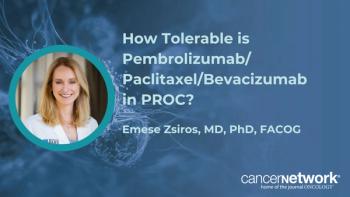
AI and Changing the Future of Pancreatic Cancer Screening
In an era where medical records are digitalized, artificial intelligence has the potential to identify patterns that can locate at-risk patients with pancreatic cancer.
As artificial intelligence (AI) continues to develop, there is potential that it will be able to access the largely digital medical record database and identify patterns for assessing pancreatic cancer risk that humans are unable to see, according to Brian M. Wolpin, MD, MPH.
Wolpin, director of the Gastrointestinal Cancer Center and co-director of the Pancreas and Biliary Tumor Center, and Robert T. and Judith B. Hale Chair in Pancreatic Cancer at Dana-Farber Cancer Institute, and professor of medicine at Harvard Medical School, spoke with CancerNetwork® about his presentation at the 15th Annual Ruesch Center Symposium on assessing pancreatic cancer risk.1 He stressed the amount of untapped information—diagnoses, medicines, and blood tests—currently sitting in the medical record database that, if it could be parsed, could identify more markers of pancreatic cancer risk.
Wolpin specifically mentions a paper he and co-authors published in the Journal of Neuroendocrine Tumors and Pancreatic Diseases and Sciences, that focuses on AI as a potential tool for pancreatic cancer risk “stratification and identification in general health care” and how it can be operationalized.2 He further emphasized that a great deal of work is still being put into making AI functional in this way so that it can improve early detection of pancreatic cancer.
Transcript:
Some of the other work that I presented at the symposium was around using machine learning models and artificial intelligence. What we’ve been thinking quite a bit about is that much of our data now, [for] patients, is included in a medical record that is digitized. There’s digital data on all the medicines we take, all our laboratory tests over the past few years, and all of our medical conditions. What it has felt like, for a number of years now, as this has been happening, is that there’s a lot of untapped information in the medical record that might clue us into who’s at risk for pancreatic cancer. The patterns in the medical record can be hard for us to see, and that’s what we’re trying to use the machine learning approach to help us with. What are the patterns that we may not be realizing that are in the medical record already? [There are] diagnoses and medicines and blood tests that might allow us to tell a doctor that their patient is at risk for pancreatic cancer in the next year.
We published a paper last year—a big group, not just me, but a big group of us at Dana Farber—trying to show how this might be done and how you might operationalize an approach like this. There’s a substantial amount of work going on now, trying to figure out how you would make this clinically relevant. As you can probably tell, a lot of this work is thinking, how do we bring some of these techniques to the clinic to try to help patients soon—because this is a hard disease, and we need to make progress soon. A lot of work is going on now, and this type of work that I was describing is facilitated by large medical record systems that are digital, and the advances in AI. That allows, when you put these 2 things together, [for it] to have some potential benefit for early detection of pancreatic cancer.
References
- Wolpin BM. Expanding the toolbox for pancreatic cancer risk assessment. Presented at the 15th Annual Ruesch Center Symposium; November 21-23; Washington, DC.
- Kenner B, Chari ST, Kelsen D, et al. Artificial intelligence and early detection of pancreatic cancer: 2020 summative review. Pancreas. 2021;50(3):251-279. doi:10.1097/MPA.0000000000001762
Newsletter
Stay up to date on recent advances in the multidisciplinary approach to cancer.










































